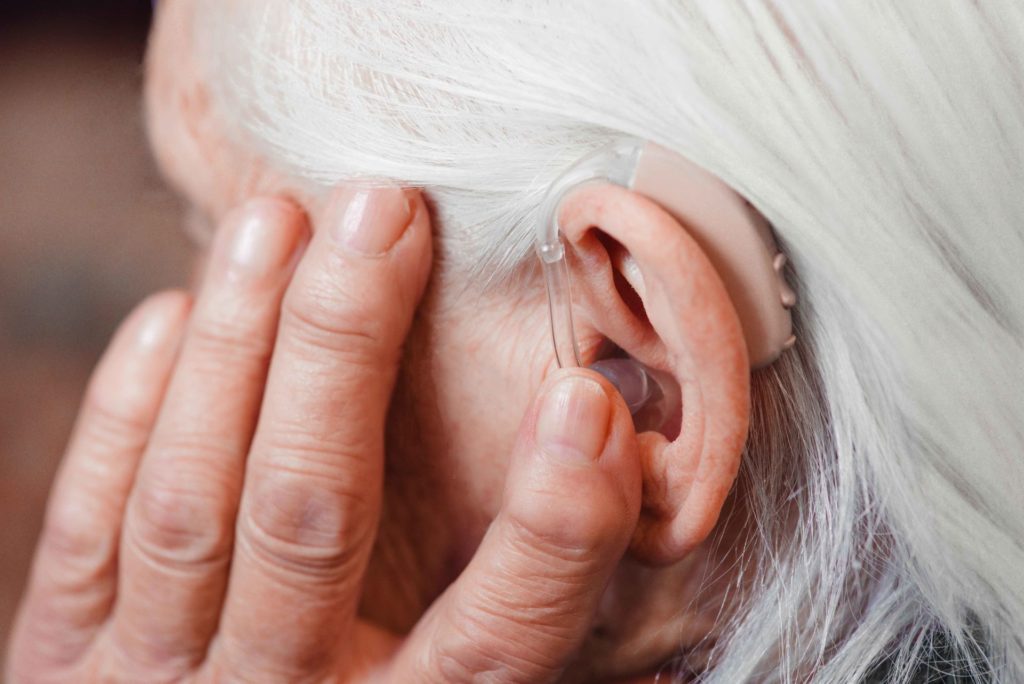If you currently use the assistance of hearing aids for your hearing loss, you may be wondering if wearing a hearing aid is a disability. This is an important question to consider, as there may be benefits and assistance you could be entitled to. Although deafness and hearing loss is defined as a disability under the Equality Act 2010, this is to ensure those suffering from hearing loss still have equal opportunities to work. To be eligible for the assistance that comes with a hearing loss disability there are a variety of tests that need to be undergone.
In this blog, we will be exploring when wearing a hearing aid is considered a disability in the UK, and what tests you may need to be professionally diagnosed with hearing loss. In addition to what is meant by the term ‘disability’. We will also be suggesting different methods on how you can cope with your hearing loss, as it can add a lot of stress on the day to day life, especially for those who are experiencing hearing loss for the first time.
What is a disability?
The official definition of disability is: ‘a physical or mental condition that limits a person’s movements, senses, or activities.’ As we are talking about hearing loss we are referring to a disability affecting one’s senses. Hearing loss can affect a person beyond just their hearing ability, impacting their wider quality of life.
Biological impacts
We know through scientific research that hearing loss can act as a catalyst for atrophy in the brain. Atrophy describes a loss of neurons inside the brain and the connections between them. This can either be as a generalised influence affecting the whole brain, or as a focal point only affecting a specific part of the brain. Atrophy can lead to memory loss in addition to adding difficulty in performing everyday tasks – this is why people with severe hearing loss are five times more likely to develop dementia.
Currently, the best way to combat atrophy is simply through regular exercise and better nutrition. It is also important to keep your mind functioning and exercising so you can keep your brain at a good operative level. You can try this through puzzles or games which encourage your brain to work out tasks. Below is a list of simple brain exercises you can try for yourself:
- Sudoku – a number puzzle which acts as a beneficial cognitive stimulus for the brain
- Solitaire – this game can improve your memory and reflexes, however, playing for extended periods of time can lead to fatigue so it is best to play in short bursts.
- Brain teasers – worded puzzles which make you use logic and problem-solving skills. For example; ‘A man pushes his car into a hotel and tells the owner he’s bankrupt. Why?
He’s playing Monopoly
- Board games – Board games come in a wide variety and are often played within a collective making it a fun choice when with friends and family and can help you with a variety of skills including; problem-solving skills, reflexes, numerical problem solving and communication skills.
Mental impacts
Since hearing loss impacts your ability to clearly hear others it can easily cause isolation as people may feel embarrassed or anxious when trying to communicate with others. Speech may also be impacted by hearing loss since it can affect your ability to hear yourself speaking. Therefore, this can also lead to isolation, since you may not feel comfortable speaking around others.
When isolated from friends and family, feelings of grief and anger can begin to arise, especially if your hearing and speech were not an issue previously. Humans are inherently social, this is not something that can be controlled, and it can be hard to think of a life living in complete isolation. Having your ability to communicate freely taken away can take a large toll on one’s mental health, expressing your ideas and feelings will take a lot more confidence and require the support of people around you. Without encouragement and motivation from others, it can feel easy to turn to the assistance of alcohol or drugs, so it’s important to find people who you trust to begin building up your confidence and mental health again.
Adapting to a new lifestyle of living with hearing loss can take time. If you’re finding that you don’t have someone to talk to, or you are struggling to cope with hearing loss, here is a link to BID Services. These professionals offer hearing loss support services including drop-in events, group sessions and online information and guidance. They are based in the Midlands area and offer their services across a large range of counties, however, if you can’t reach them they still extend their services online. If you would like a guide on how you can help yourself adapt to hearing loss, and overcome any challenges regarding your communication here is a guide from the RNID. Here you can find assistance on various areas of hearing loss and how you can better your hearing and communicate with more confidence.

When is hearing loss identified as a disability?
Hearing loss currently affects over 5% of the world’s population and it’s estimated that in 2050 one in every ten people will experience hearing loss. A large percentage of these people currently affected are also seeking rehabilitation services to help with their hearing disability.
‘Disabling’ hearing loss is presently a hearing loss greater than 35 decibels (dB). The severity of your hearing loss is determined through hearing tests. During a hearing test, a professional audiologist can specifically find which areas of hearing you are struggling with in addition to the extent. If you find yourself suffering from severe hearing loss you can apply for various benefits which can assist you financially with working and travelling to help ease any stress you may be undergoing. Support will also be offered at this stage to help you cope with any mental strains you may be undergoing. If you would like to find out what happens during a hearing test you can click on the link and read our guide going through the process. Moreover, if you are unsure as to whether you need a hearing test we have written a guide on the signs and symptoms indicating that you may need a hearing test.
Book an appointment for a hearing test
You can book a hearing test appointment with us today by either clicking on the link or call us at 0114 395 2039. Moreover, if you have any inquiries you can email us at info@hearingtherapy.co.uk. We hope this guide has helped you gather a better understanding of hearing loss and the additional problems it can entail. In addition to being able to help you find some support if needed.


